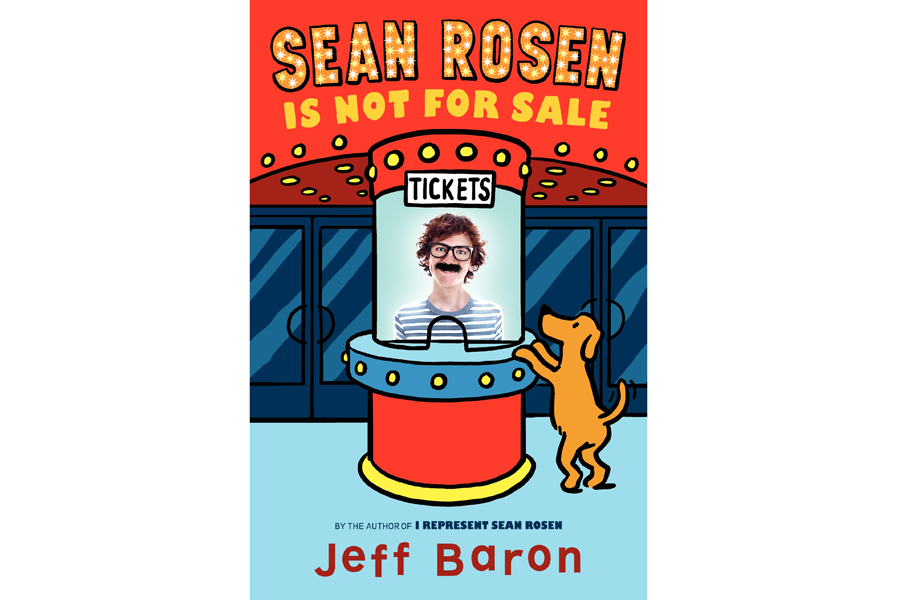By the Book: 'Sean Rosen' – Engaging Novels for Ages 8 and Way Up

Jeff Baron and the fictional Sean Rosen share bio credits on the back flap of Sean Rosen Is Not For Sale, 2014 (an earlier book, I Represent Sean Rosen, 2013, has just come out in paperback).
While Baron lives in New York—when he’s not on Shelter Island—Rosen “doesn’t want you to know where he lives.” Once you get started on either book (order not crucial), however, you’ll know why. You’ll laugh at and admire 13-year-old Sean’s antics and appreciate Baron’s delicious humor and playful imagination. Baron says he conceived of the Sean books for adults, but let his publisher, Greenwillow/HarperCollins, convince him otherwise, saying that they were for kids because they center on life in middle school. The publishers were right, Baron says, though the good news is that teachers and parents as well as third graders on up can all delight in what Baron has wrought. The books work on all levels—young, YA (young adult) and adult, and they opened up a new professional area for the multi-talented Baron whose impressive résumé, until Sean, reflected only the adult world. His best-known work, the moving, serio-comic stage play, Visiting Mr. Green, is about an 86-year-old widower.
Working with middle school teachers and principals and school and area librarians to fashion creative writing programs based on Sean’s passion to be a screenwriter, Baron couldn’t feel more at home. This past November he was a panelist at The National Council of Teachers of English annual convention where he spoke about Sean-inspired projects, some of which can be seen on YouTube and on Sean’s website, seanrosen.com—podcasts about donuts, hair, dogs, the post office and his cousin’s bar mitzvah—which further the fictional fun.
The books and the podcasts are already part of the Ardsley Middle School seventh grade curriculum, and Baron is especially pleased with the involvement of the school librarian Jean Mancuso—for creating a lively community learning center in the library, a place that in his day was “a ghost town where you were sent once a year to learn the Dewey Decimal System.” (Adults will groan with remembrances of library tours past). Baron says that he hears from kids constantly about Sean’s exploits. Parents and teachers tell him that boys, who tend to read less than girls, feel connected to Sean. He speaks to them, and he speaks like them. There aren’t many books for boys that aren’t about sports or combat. The stories also subtly engage ethical issues, Baron notes, problems that come up at school and at home. Though Sean is secretive about his Hollywood ambitions, not telling his family, his first-person narration lets the reader in on his inner thoughts, fantasies and fears.
From the opening lines, it’s clear that Baron’s books are realistic and engaging, without ever being precious or contrived, an amazing achievement for a writer who is relatively new to children’s literature. An accomplished screenwriter, filmmaker, librettist, journalist and playwright (Visiting Mr. Green, which premiered with Eli Wallach, has so far had over 400 productions in 43 countries), Baron says he had never written a novel before I Represent Sean Rosen, but that once Sean’s voice popped into his head and he started talking, that was it. Though at first he wondered if a book about a kid who wants to write a Hollywood script would fly because it includes mature stuff about contracts, deals, public relations and studio exec behavior, he didn’t have to wonder for long. The very fact that Sean takes on the adult world is the book’s charm. Kids today, Baron notes, are more savvy about the adult world than he was—they’re “much more entrepreneurial.”
At Ardsley, all 160 seventh graders, including special ed kids, get involved in the Sean-related projects. Like Sean, they interview family members or older relatives or family friends about what seventh grade was like when they were kids. “Using tools I use myself as a writer,” Baron says, “the students analyze the interviews and they each create a character based on their grandparent in seventh grade.” Then in groups of four, they write and perform an original play, using those characters, in period dress. Baron also teaches the kids how to pitch ideas, Hollywood style, and gives them feedback and suggestions “the way a studio executive would.” It all continues to be, he is delighted to report, “a blast.” Parents should not wait for summer vacation to suggest these books to their children.








